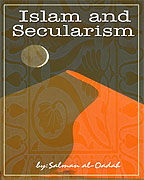Islam And Secularism

CHAPTER TWO
No Place for Secularism in the Muslim World
We established in the previous chapter that secularism, in its very nature, violates the principle of monotheism. Now we turn our attentions to the question of the possibility of secularism existing in the Muslim world. Can a Muslim who prays in the mosque acceptsecularism?
The mosque in Islam is not a place wherein people recite their prayers and then leave their religion at the door on the way out. The mosque is not only a place of worship for the Muslim, but a place of guidance and learning. It must have a lasting effect on the Muslim that he takes with him when he returns home, goes to work, or shops in the market. When a Muslim’s heart is tied to the mosque, his prayers in the mosque affect his life, keeping him from sin and guiding him to what is best. A Muslim listens to Allah’s laws when he is seated in the mosque, laws that cover all aspects of his life, great and small. The mosque, therefore, should be the starting point of all life’s activities.
Secularism has no place in the lands of Islam for two reasons:
The first of these is that Islam is the religion that Allah sent down to replace the previous manifestations of the faith and to govern all aspects of life. The simplest Muslim can see how Islam explains all matters in detail. It is impossible for a Muslim to feel that the religion that regulates his marital affairs, his business, his eating habits, his manner of sleeping, and even how he goes to the bathroom could ever leave managing the political and economic affairs of society to other than Allah. For Allah says:
“We have neglected nothing in the Book.” [Sûrah al-An`âm: 38]
“We have sent down to you the Book explaining all things” [Sûrah al-Nahl: 89]
This issue is not open for debate. Islam, as the final religion, has supremacy over all faiths and over every aspect of life. There is no place for secularism in the lands of Islam or among the Muslims.
The second reason is that throughout the history of Islam, it never experienced the troubles that were faced by Europe on account of its corrupted faith. Among the most important of these was the horrific breach that took place between religion and science. Religion fought against science so fiercely that the church burned some scientists to death on the grounds that those scientists went against the word of Allah.
Islamic history contains nothing of the sort. Islam opened the doors to scientific enquiry and encouraged intellectual activity. Scientists were frequent guests at the courts and assemblies of various caliphs and received a fair share of royal gifts and patronage. The Muslim world never in its long history encountered the persecution and restriction of its scientists. There were no inquisitions like there were in Europe.
Islam never experienced the abuses of a Church that took from the people great sums of money, restricted their intellectual lives, and burned their scientists and thinkers, all in the name of religion. Quite the contrary, Muslim history is one of amicability between science and the religion whose first revelation was “Read in the name of your Lord who created.” Science is one of the fruits of proper adherence to Islam. It is a result of obeying Allah’s command to learn, teach, read, and study.
Those who wish to bring secularism to the Muslim world ignore this major difference between the religious history of the Islamic world and the religious history of Europe wherein secularism developed.
